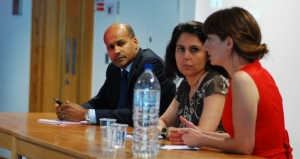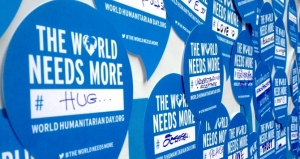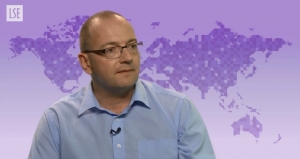Dr Stuart Gordon, Programme Director for the MSc International Development & Humanitarian Emergencies, gave a paper at Manchester University’s three-day international conference: ‘A Quest for Humanitarian Effectiveness?’
The paper was co-authored with Antonio Donini, former Director of the UN Office for the Coordination of Humanitarian Assistance to Afghanistan (1999-2002) and Chief of the Lessons Learned Unit at the UN’s Office for the Co-ordination of Humanitarian Affairs (OCHA) and a well-known researcher in the field of humanitarian studies.
Over 250 delegates attended the conference, with participants drawn from universities and humanitarian relief organisations from around the world.
Stuart and Antonio’s paper, “Romancing Principles and Human Rights – Are Humanitarian Principles Salvageable?” was based on an article accepted for a special edition of the International Review of the Red Cross and also featuring the LSE’s own Director, Craig Calhoun, writing on the changing nature and impact of emergency imaginaries; cognitive maps that drive perceptions of and responses to crises.
Dr Gordon discusses the MSc International Development & Humanitarian Emergencies
The paper explored the impact of ‘new humanitarianism’ on ‘traditional’ or ‘classical’ humanitarianism. It questioned whether the humanitarian principles – of humanity, impartiality, independence and neutrality – represented an authentic and fixed consensus on the nature and content of humanitarianism by situating them within a changing vision of the content of humanitarian action.
It then mapped the origins and content of the post-Cold War critique of the humanitarian system, and particularly the criticism of the principles leveled in the ‘new humanitarian’ literature. It portrayed this critique as the product of an alternative paradigm for assistance that posed an existential threat to humanitarianism through challenging both the ethical content and operational relevance of traditional humanitarian principles.
It also evaluated the nature of these criticisms and in particular those leveled against the concept of neutrality. The paper questioned whether the context of humanitarian action had changed to such a degree that the principles no longer remained the most effective means of guaranteeing access; concluding that critics have both misrepresented the ethical content of neutrality and obscured what amounts to significant adaptations within the classical system that (arguably) underline its continuing operational relevance.
In fact, when operationalized consistently, the principles offer the best mode of access but at the expense of the much broader aims of new humanitarianism. It also argued that it is inevitable and beneficial that new humanitarian paradigms will (and in fact already are) emerge alongside traditional humanitarianism but the latter remains valuable and deserving of maintenance.
Related Posts
   |





